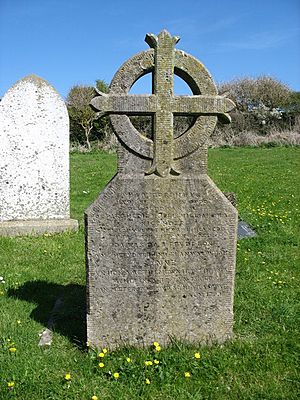Morris Williams facts for kids
Morris Williams (born August 20, 1809 – died January 3, 1874) was a Welsh church leader and writer. Many people knew him by his special poetic name, Nicander. He helped create the Welsh Prayer Book in 1841. He also wrote his own version of the Psalms of David in Welsh, set to music.
Contents
Early Life and Education
Williams was born in Caernarfon, Wales. His father was William Morris. His mother, Sarah, was the sister of a poet named Peter Jones (also known as Pedr Fardd). His family later moved to a place called Coed Cae Bach in Llangybi. Morris went to school in Llanystumdwy. After school, he started training to become a carpenter.
People soon noticed his amazing talent for writing poetry. Because of this, he was able to go to the King's School, Chester. After that, he studied at Jesus College, Oxford University. In 1836, he became an Anglican clergyman, which is a type of church minister. He worked in different churches, including Holywell, Bangor, Pentir, and later Amlwch in Anglesey.
In 1840, Morris Williams married Ann Jones from Denbigh. They had eight children together.
Poetic Achievements
Morris Williams was very good at poetry. In 1849, he won a special award called the bardic chair at the Aberffraw Eisteddfod. An Eisteddfod is a big festival in Wales where people compete in music, poetry, and other arts. He won for a long poem called an awdl about the Creation.
In 1859, he became the Rector (the main priest) of Llanrhuddlad. This included the churches of Llanfflewyn and the quiet St Rhwydrus's Church, Llanrhwydrus in Anglesey. He won the bardic chair again in 1861 at another Eisteddfod in Aberdare.
Religious Writings
Morris Williams had strong religious beliefs. He followed a movement called the Oxford Movement, which focused on traditional Christian teachings. While he was working in Holywell, he was one of four people chosen to help update the Welsh Prayer Book. This new version was published in 1841.
Later, when he was a pastor in Amlwch, he translated the Book of Psalms into Welsh poetry. He called his work Y Psallwyr, neu Psalmau Dafydd (The Psalter, or the Psalms of David). He wanted to make singing psalms more popular by using many different musical styles. He finished his psalter in 1850. In 1851, he started working on a new large edition of the Welsh Bible for a group called SPCK (Society for Promoting Christian Knowledge).
Main Works
- Y Flwyddyn Eglwysig (1843)
Translations
- Disce Vivere (1847)
- Disce Mori (1848)
- Y Psallwyr (Metrical version of the Psalter) (Llundain: H. Hughes; 1850)
Edited Works
- Llyfr yr Homiliau (1847)
- Works of Dafydd Ionawr (1851)
 | Audre Lorde |
 | John Berry Meachum |
 | Ferdinand Lee Barnett |


